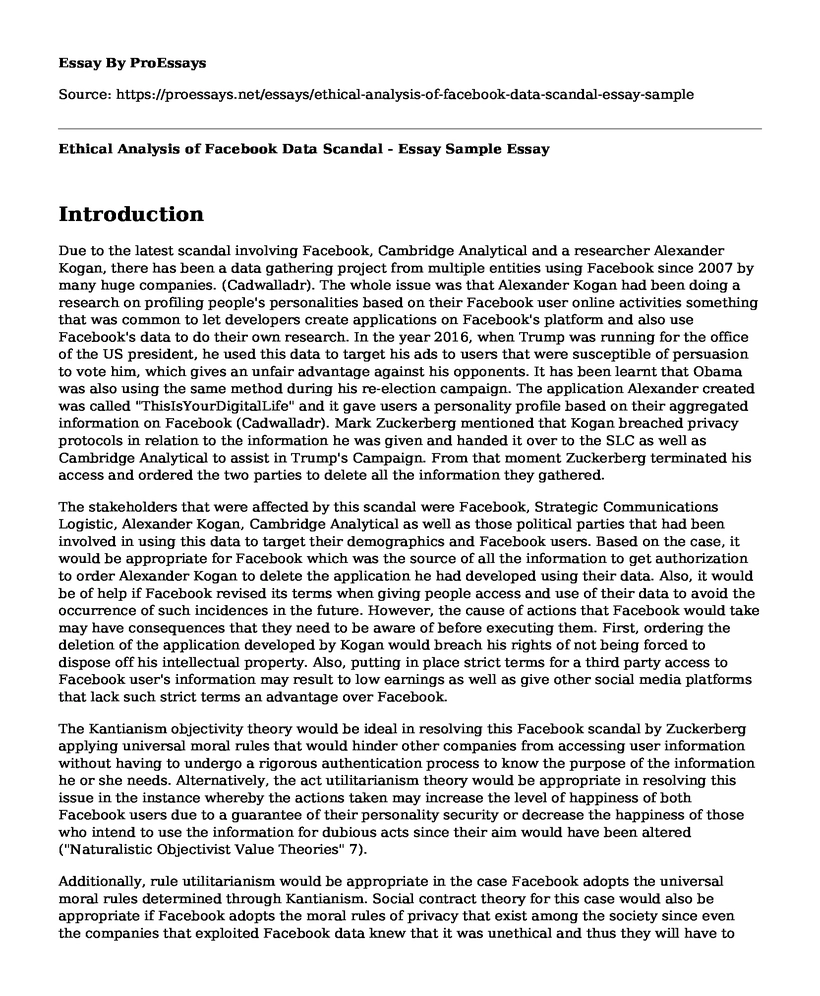Introduction
Due to the latest scandal involving Facebook, Cambridge Analytical and a researcher Alexander Kogan, there has been a data gathering project from multiple entities using Facebook since 2007 by many huge companies. (Cadwalladr). The whole issue was that Alexander Kogan had been doing a research on profiling people's personalities based on their Facebook user online activities something that was common to let developers create applications on Facebook's platform and also use Facebook's data to do their own research. In the year 2016, when Trump was running for the office of the US president, he used this data to target his ads to users that were susceptible of persuasion to vote him, which gives an unfair advantage against his opponents. It has been learnt that Obama was also using the same method during his re-election campaign. The application Alexander created was called "ThisIsYourDigitalLife" and it gave users a personality profile based on their aggregated information on Facebook (Cadwalladr). Mark Zuckerberg mentioned that Kogan breached privacy protocols in relation to the information he was given and handed it over to the SLC as well as Cambridge Analytical to assist in Trump's Campaign. From that moment Zuckerberg terminated his access and ordered the two parties to delete all the information they gathered.
The stakeholders that were affected by this scandal were Facebook, Strategic Communications Logistic, Alexander Kogan, Cambridge Analytical as well as those political parties that had been involved in using this data to target their demographics and Facebook users. Based on the case, it would be appropriate for Facebook which was the source of all the information to get authorization to order Alexander Kogan to delete the application he had developed using their data. Also, it would be of help if Facebook revised its terms when giving people access and use of their data to avoid the occurrence of such incidences in the future. However, the cause of actions that Facebook would take may have consequences that they need to be aware of before executing them. First, ordering the deletion of the application developed by Kogan would breach his rights of not being forced to dispose off his intellectual property. Also, putting in place strict terms for a third party access to Facebook user's information may result to low earnings as well as give other social media platforms that lack such strict terms an advantage over Facebook.
The Kantianism objectivity theory would be ideal in resolving this Facebook scandal by Zuckerberg applying universal moral rules that would hinder other companies from accessing user information without having to undergo a rigorous authentication process to know the purpose of the information he or she needs. Alternatively, the act utilitarianism theory would be appropriate in resolving this issue in the instance whereby the actions taken may increase the level of happiness of both Facebook users due to a guarantee of their personality security or decrease the happiness of those who intend to use the information for dubious acts since their aim would have been altered ("Naturalistic Objectivist Value Theories" 7).
Additionally, rule utilitarianism would be appropriate in the case Facebook adopts the universal moral rules determined through Kantianism. Social contract theory for this case would also be appropriate if Facebook adopts the moral rules of privacy that exist among the society since even the companies that exploited Facebook data knew that it was unethical and thus they will have to abide by the action taken since it is universally accepted among the members of the society. Since Kogan never acted in a morally virtuous way when exploiting Facebook's user data to use it in developing applications that might have altered the will of the people, the Virtuous objectivity theory would also be appropriate in solving the issue at hand.
Regarding the ACM and SE code of ethics, Kogan never acted consistently with the public interest as a software engineering when he decided to manipulate Facebook user data to create an application whose aim of influencing the will of the people (CACM Staff 5). Also, the clause on the judgment that a software engineer needs to maintain high levels of integrity in their profession was not followed by the various organizations that manipulated Facebook user data to influence the results of the US elections.
Conclusion
Therefore, based on what the Facebook scandal involved, I would recommend that Facebook and other social media platforms that have vital user information that can be used to give people a personality profile that would be ideal for such manipulations to put strict terms that various organizations have to meet before being granted access to the information. Such terms would discourage those that are focused on using the information on their platforms for malicious acts like those of Kogan.
Works Cited
CACM Staff. "Keep the ACM code of ethics as it is." Communications of the ACM, vol. 61, no. 3, 2018, pp. 10-11, doi:10.1145/3183570.
Cadwalladr, C. "Revealed: 50 million Facebook profiles harvested for Cambridge Analytica in major data breach." 24 Mar. 2018, www.theguardian.com/news/2018/mar/17/cambridge-analytica-facebook-influence-us-election.
"Naturalistic Objectivist Value Theories." Encyclopedia of Quality of Life and Well-Being Research, 2014, pp. 4264-4264, doi:10.1007/978-94-007-0753-5_102673.
Cite this page
Ethical Analysis of Facebook Data Scandal - Essay Sample. (2022, May 30). Retrieved from https://proessays.net/essays/ethical-analysis-of-facebook-data-scandal-essay-sample
If you are the original author of this essay and no longer wish to have it published on the ProEssays website, please click below to request its removal:
- The Cons of Online Dating Essay Example
- Movie Analysis Essay on Roots - The Triumph of an American Family
- Essay Sample on Social Networking
- Movie Analysis Essay on War on the EPA
- Segna di Bonaventura: Master of Sienese School Art - Essay Sample
- Paper Example on UK Building Regulations: Ensuring Safety, Accessibility, and Environmental Protection
- Essay Example on Marketing Music on YouTube: The Ultimate Platform for Musicians







